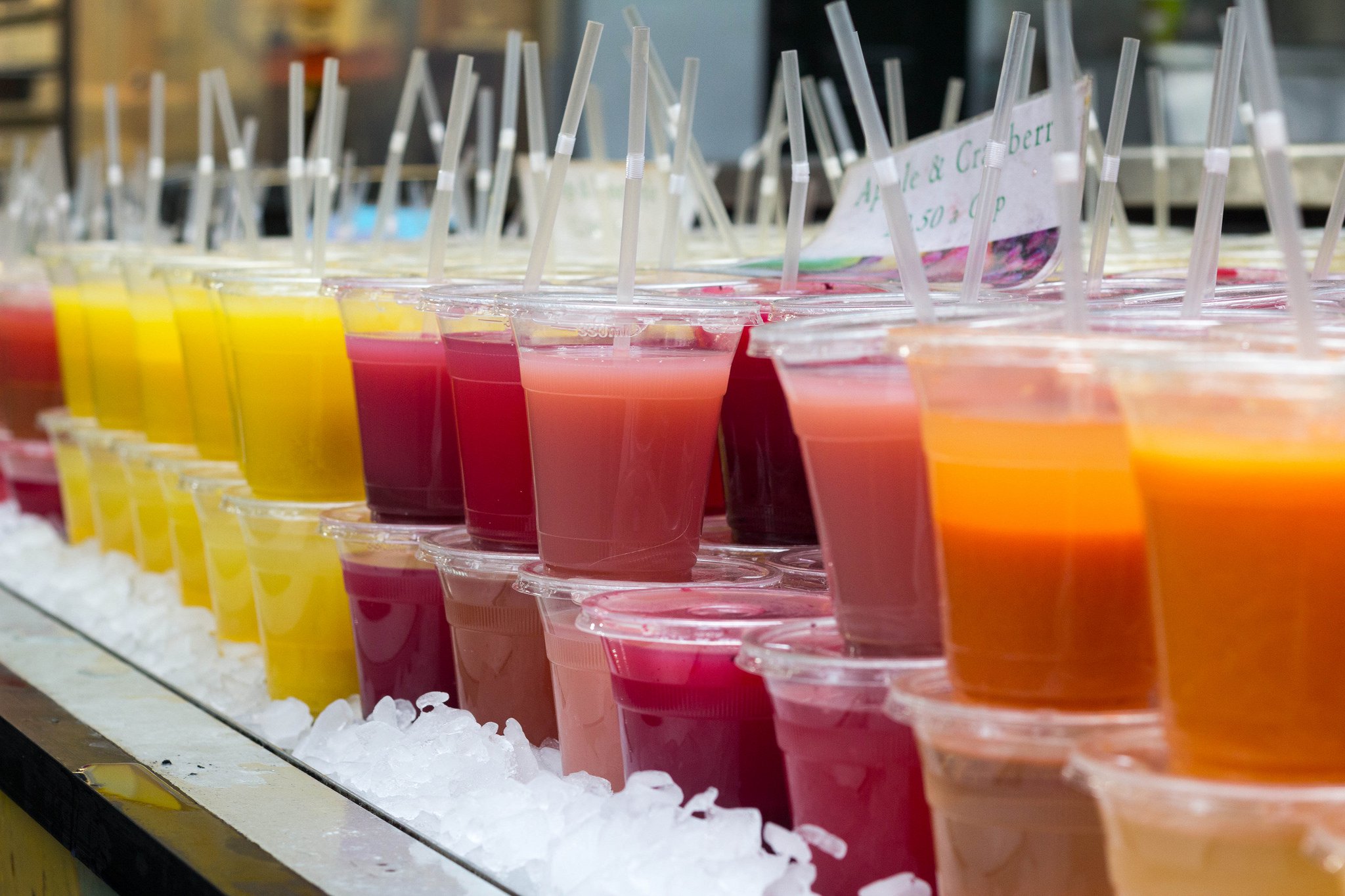4 Common Drinks That are Worse for Your Teeth Than Soda
Soda or fruit juice —which one is better for your teeth? If you think the answer is juice, you’ll have to think again. Here’s why:

Photo by Catherine Sharman via Flickr.
When trying to make a healthier choice for your mouth, you might think juice would be better than soda. However, research is showing that “healthier” choices like juice, diet soda, and even tea are not much better than sugary soft drinks. These types of drinks are exposing the teeth to tooth decaying acids, causing dental erosion that leads to cavities and other health problems.
According to a 2015 study published in the Journal of Public Health Dentistry, a substantial proportion of adults have dental erosion. Researchers say that anything with a pH value (the measure of acidity) lower than 5.5 can damage the teeth. If consumed too much, diet and regular sodas, carbonated drinks, flavored fizzy waters, sports drinks, fruit and fruit juices can be be harmful to teeth.
So how can you protect your teeth from dental erosion? Why do sugar and acid cause tooth decay? What drinks should you be avoiding?
We’ve laid out everything you need to know to answer those important questions and help you protect your oral health:
What causes dental erosion?
Dental erosion occurs when the enamel (the hard, protective coating on your teeth) is eaten away by an acid attack. Our mouths are full of hundreds of different types of bacteria. Both helpful and harmful bacteria live on the teeth, gums, and tongue. Tooth decay has 2 main culprits: Sugar and acid.
Sugar
Tooth decay is caused by a certain kind of bacteria that causes an infection as it uses sugar to make acids. Thus, the more sugar you consume, the more acids are produced, which over time creates a cavity in the tooth.
Acid
When you eat or drink something acidic, the enamel in your teeth is temporarily softened. Frequent exposure to acid eats away at the protective layer on your teeth.
Every time your teeth are exposed to anything acidic or sugary, the enamel loses some of its mineral content. To get it back to it’s natural balance, your saliva will slowly cancel out the acidity by re-mineralizing the enamel. But when acid attacks occur frequently, bits of enamel are brushed away and lost before your mouth has a chance to repair itself.
"Cavities form when bacteria in the mouth mix with sugar, leading to decay. Erosion occurs when chemicals strip the mineral off the teeth. The seriousness of the erosion is far more than decay," said Dr. Mohamed Bassiouny, a restorative dentistry professor at Temple University. "Erosion affects all teeth at once, as you can imagine acidic fluid is running through the entire mouth.”
Drinks that Promote Tooth Decay
1. Diet Soda
Dentists often warn their patients about the consequences of drinking sugary sodas. But did you know that your teeth aren’t faring any better with diet soda? Research is showing that the lack of sugar is not making these drinks any less corrosive, as most soft drinks still have a significant amount of acidity. In fact, Bassiouny says that the carbonation could make the drink more acidic.
For example, one of Bassiouny patients came to him after drinking a liter of diet soda every day for the past three years. He said that her teeth were comparable to that of a methamphetamine user, commonly called “meth mouth.” The corrosive chemicals from that drug cause severe tooth decay, making teeth crumble, discolor, and crack. Unfortunately, consuming diet soda on the regular can cause similar oral damage over time.
2. Energy drinks
A 2008 study published in the journal Nutrition Research showed that energy drinks and sports drinks, like Red Bull and Gatorade, eroded enamel more than soda or fruit drinks. Researchers at the University of Iowa’s College of Dentistry soaked extracted human teeth in various liquids for 25 hours and then measured the structural changes.
"Power drinks can be quite acidic, usually because there is an addition of citric acid to those to give it tartness that is desired by some consumers," said Dr. Clark Stanford, the associate dean for research at the University of Iowa College of Dentistry. "It's important to look at the label and see if citric acid has been added."
3. Tea
Tea is often seen as a healthier alternative to sodas and sugary drinks because of its antioxidants. However, in the same study at the University of Iowa, Stanford and his team also found that black tea is corrosive to teeth as well. "Tea is controversial," Stanford said. "Certain types of tea can actually stabilize the amount of tooth loss or demineralization of the surface. Others, if they have a low pH, can cause natural erosion of the tooth surface."
In a similar study conducted by Bassiouny, human teeth were soaked in unsweetened green and black tea. He found that black tea eroded teeth more rapidly than green tea. Still, tea is not nearly as bad as other acidic or sugary substances. Teeth soaked in substances like lemon juice, vinegar, and soda showed changes and lesions by the second week, whereas black tea did not erode the teeth until the 16th week.
4. Citric Juices
Fruits like grapefruits, oranges, and lemons are loaded with acids that wear down tooth enamel. When they are concentrated down into juice, drinking it exposes your teeth to more damaging amounts of acidity. In fact, research has found that orange juice has the capacity to decrease enamel hardness by 84%. "We encourage adults if they're going to have kids drink fruit juices, which is good in a way, that they consume it all at once instead of sipping on it all day long," Stanford said.
However, this doesn’t mean you should stop consuming juice altogether. After all, natural juices are packed with vitamins and antioxidants that your body needs. Instead of sipping juice throughout the day, reduce its exposure to your mouth by drinking it in one sitting. You can also look for juices fortified with calcium to help strengthen the enamel on your teeth.
Foods and Drinks that Protect Against Tooth Decay:
Milk
Milk contains phosphorus, calcium, and casein which all help strengthen teeth and stop decay. Plus, the sugar found in milk is lactose, which does not promote decay as much as other sugars because it produces less acids.
Cheese
Cheese helps defend your teeth against decay because it stimulates saliva production. It’s best consumed after a sugary snack to prevent an increase in acidity. Plus, its high calcium content influences the recalcifying of teeth.
Plants
Natural sugars found in fruits and vegetables are not nearly as harmful as the processed sugars found in soda and energy drinks. Fibrous plant foods protect teeth by stimulating saliva production.
"Water and milk are the best choices by far, not only for the good of our oral health but our overall health too," says Dr. Nigel Carter, chief executive of the British Dental Health Foundation. "Remember, it is how often we have sugary foods and drinks that causes the problem so it is important that we try and reduce the frequency of consumption."
How to protect teeth against erosion:
1. Stick to natural Sugars
Instead of satisfying your sweet tooth with processed sugary beverages and treats, stick to natural and healthy beverages and foods. You can easily juice your own fruit and veggies to create a sweet and satisfying drink. Just remember that’s it’s best when consumed all at once instead of frequent sips throughout the day. That way, you can limit the exposure of sugar and acid to your teeth.
2. Sip smart with Soda
If you’re going to consume soda and other sugary beverages, be smart about it to keep your teeth protected. Limit the amount you drink (maybe stick to one small soda a day instead of one per meal). Use a straw so that your teeth aren’t immersed in the liquid, and take sips of water between drinks to reduce the acidity in your mouth.
3. Keep your sugary snacks to a minimum.
It’s understandable that you might need a pick-me-up snack in the afternoon as you wrap up a workday. But it’s best for your oral health that you limit the amount of sugary snacks to reduce acid attacks. Also, don’t eat for at least for an hour before bedtime. During the night, low salivary rates during sleep reduce the ability to neutralize acid.
4. Keep up with regular dental visits.
Getting your teeth cleaned and checked regularly will help protect your them against decay. Not only will dental treatments keep your enamel healthy to withstand acid attacks, it also helps to catch cavities early on. That way you can have treatment before any serious damage to your teeth occurs. To get keep your teeth in optimal condition, it’s important that you have access to affordable dental care.
For more tips in maintaining oral health, you can find more articles on our blog.





